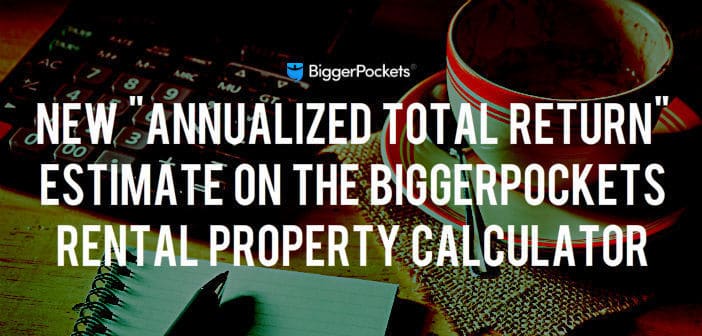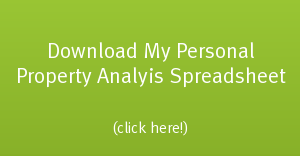
I like to buy fixer-upper rental properties.
It can be a great way to build serious equity up front, as well as take care of most of the “cap ex” expenses before the property is ever rented out. And, of course, nice houses tend to attract nice people.
However, it can be tough to calculate the value of those improvements on a “return on investment” level.
For example, you might buy a fixer-upper property and build $50,000 of equity into the deal — but not get the greatest cash flow because of that.
Does that mean the deal is bad?
Not necessarily. Your total return on investment is based on more than just cash flow — it’s also based on any appreciation you get (whether “forced” or “natural”) and the loan being paid down over time. I’m not suggesting you buy a bad deal just because you think appreciation is going to increase. However, it can be helpful to look at more than just the cash on cash return.
Let me give you a quick example:
Let’s say you bought a house for $100,000. You put 20% down ($20,000), paid $5,000 in closing costs, and spent $50,000 of your cash rehabbing the property. So, you’ve now spent $75,000 of your money on this property. Now, let’s say that the property produces $4,000 per year in “cash flow” for you, after all the expenses have been paid. Therefore, you could say that your “Cash on Cash Return” is 5.3% because $4,000 / $75,000 = .0533.
Is that a good deal?
Related: The Top 8 Real Estate Calculations Every Investor Should Memorize
Well, it depends.
After all, what if, after the property was fixed up, it’s now worth $300,000? That changes things a bit, doesn’t it? What if it’s worth $500,000? Or $1,000,000? Yes, that’s probably absurd, but it illustrates a point: Cash on cash return isn’t everything, especially when you are dealing with fixer-upper rentals.
Furthermore, let’s say that you rented that same property out to some tenants for 10 years and then sold it. During that time, the value went from our original $300,000 all the way to $400,000 — but the loan that we had for $80,000 was paid down to $65,000. We now have a pretty massive amount of equity in this deal — over $300,000! BUT we still might only be getting that 5.3% cash on cash return if rents did not increase. Someone who ONLY looks at cash-on-cash return might never have purchased that property because it didn’t meet their cash-on-cash return requirement. And they would have missed out on potentially $300,000 in profit.
Introducing: “The Annualized Total Return”
This is why BiggerPockets just introduced the “Annualized Total Return” option on the Rental Property Calculator. This simple change has made it easier for you to include any appreciation (forced and natural) that you might receive on the property AND the loan principal being paid off over time.
When running a calculation on the Rental Property Calculator, you’ll now see an option on the bottom of the third page that asks for the “Sales Expenses.” This is the percent of the total sales price that would be required to pay if you sold the property. Essentially, this number is the closing costs you would pay when you sold the property, including agent commissions. I typically use 9% or 10%, knowing that in my area, agents typically keep 6% of the sales price, my county keeps 1.5%, and the title company gets another few thousand dollars.
(Click to read on BiggerPockets…)
P.S. looking for hard money loans in California? Be sure to check out my friends over at northcoastfinancialinc.com. They have very competitive rates, can fund within a week and specialize in fix and flip loans and other hard money loans.
P.S. Looking for more real estate investing knowledge? If you are interested in a top-notch course to help you understand the nuts and bolts of creative real estate investing, I would like to recommend Ben Leybovich's Cash Flow Freedom University. Ben is a close friend and has been my trusted adviser for years. He's a smart guy and CFFU is pretty awesome. The course is waitlisted, but while you wait for an opening Ben will send you tons of FREE content. Seriously. Click here to check it out.
(yes, that's an affiliate link!)
 If this is your first time here at Real Estate In Your Twenties.com - welcome!
If this is your first time here at Real Estate In Your Twenties.com - welcome! 





